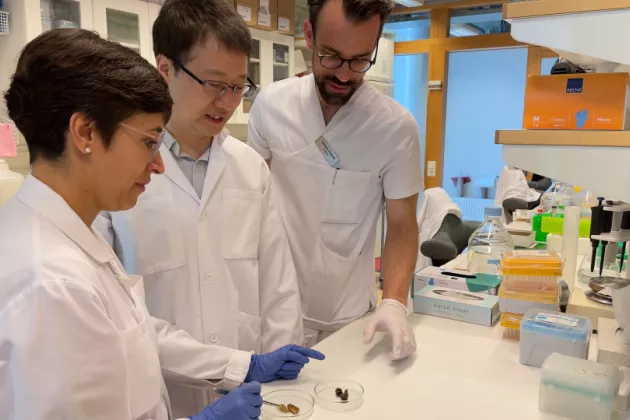Diabetes research

We conduct experimental and clinical diabetes research. Our aim is to develop new treatments and drugs that can prevent or cure diabetes, which is a fast-growing chronic disease.
It is estimated that around 500 million people worldwide have diabetes. This number is expected to rise to more than 780 million by 2045.
Type 2 diabetes is the most common form of diabetes and accounts for the largest increase. It is not yet fully known what causes type 1 diabetes and type 2 diabetes.
Several research areas working together
Lund University Diabetes Centre (LUDC) conducts extensive and multifaceted research in several areas. Researchers conduct experimental basic research in modern laboratories, study people's lifestyles, and conduct clinical trials involving patients.
The overall aim is to develop individualised treatments that provide patients the right treatments at the right time. The long-term goal is to prevent and cure diabetes as well as improve the treatment of the disease and its complications.
Among other things, the researchers study:
- classification of patient groups with diabetes for individualised treatments
- how environmental and lifestyle factors influence the development of type 2 diabetes (epigenetics)
- mechanisms that affect insulin secretion in diabetes
- autoantibodies used to identify type 1 diabetes
- ways to prevent complications and develop new treatments for diabetes
- individualised dietary recommendations to reduce the risk of obesity and type 2 diabetes
- the role of eating habits on health in people with and without diabetes.
State-of-the art research facilities
At LUDC, there is a cutting-edge laboratory where researchers collect cells and tissues from people with and without diabetes. This laboratory enables researchers to conduct experimental and clinical studies into the disease mechanisms associated with diabetes.
Moreover, LUDC houses a biobank containing plaques from people with atherosclerosis, a common complication of diabetes, which researchers are studying.
Application areas
Researchers at LUDC are working closely with Skåne University Hospital, pharmaceutical companies and other stakeholders to find new treatments and drugs to prevent, delay and cure diabetes. Some examples:
At Lund University, diabetes researchers have discovered that it is possible to categorise type 1 and type 2 diabetes into five distinct subgroups. This important discovery could lead to more individualised treatments of the disease. The researchers have also identified genetic differences between the four groups of type 2 diabetes, indicating different underlying causes to the disease.
The researchers aim is to use this genetic and clinical data to develop treatments that are tailored to each patient. The discovery is a significant step forward that can lead to improvements for people living with diabetes.
Epigenetics and genetics help illustrate how diabetes care can be individualised – ludc.lu.se
Researchers around the world strive to understand why some people develop type 1 diabetes and others do not. At Lund University, diabetes researchers are continuously studying various diabetes-related autoantibodies in children with a high risk of developing type 1 diabetes.
This research has led to the approval of these autoantibodies as a biomarker for the disease. This approval means that individuals who have at least two diabetes-related autoantibodies can participate in clinical studies designed to prevent the disease.
Blood testing in children leads to better understanding of type 1 diabetes
Several research groups at Lund University are working together to study the mechanisms behind diabetes. An important resource for diabetes research is a sample collection of insulin-producing cells and tissues from the liver, muscles and fat of people both with and without diabetes. Researchers study the cells to understand what happens to insulin secretion in diabetes. This knowledge could lead to new treatments that improve insulin secretion in people with diabetes.
The researchers also have access to a biobank containing plaque samples from people with atherosclerosis, a common complication of diabetes known to trigger heart attacks and strokes. The researchers' studies of the mechanisms behind atherosclerosis could be instrumental in developing new treatments that target dangerous plaques.
Diabetes can lead to complications such as stroke, heart attack and kidney disease. Researchers are studying various aspects, including epigenetic differences between various groups of people with type 2 diabetes, to try to predict the risk of these complications at an early stage.
Researchers are also examining the underlying mechanisms behind plaque rupture in atherosclerosis, a common complication of diabetes. The aim is to develop treatments that can prevent plaque rupture.
Research environments
Strategic research area
A significant part of diabetes research at Lund University is conducted within EXODIAB, which is a strategic research area (SRA) in Sweden.
Within EXODIAB, Lund University Diabetes Centre (LUDC) and Uppsala University work closely together. Their shared ambition is to develop new treatments and drugs that can prevent or cure diabetes.
Coordinator
Allan Vaag, professor
allan [dot] vaag [at] med [dot] lu [dot] se (allan[dot]vaag[at]med[dot]lu[dot]se)
Vice coordinator
Lena Eliasson, professor
Phone: +46(0)40 39 1153
Mobile: +46(0)70 522 5414
lena [dot] eliasson [at] med [dot] lu [dot] se (lena[dot]eliasson[at]med[dot]lu[dot]se)
Website
Research database
Related researchers, projects and publications.
Latest news in diabetes research

Positive metabolic effects of gastric bypass disappear quickly

New discoveries about where atherosclerotic plaques rupture can lead to preventive treatments
